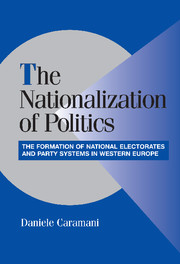 The Nationalization of Politics
The Nationalization of Politics Published online by Cambridge University Press: 02 December 2009
The nationalization of politics is a major long-term political phenomenon over almost two centuries. Nationalization processes represent a broad historical evolution toward the formation of national electorates and party systems, party organizations and campaigns, as well as issues and party programs. Through nationalization processes, the highly localized and territorialized politics that characterized the early phases of electoral competition in the nineteenth century is replaced by national electoral alignments and oppositions. Peripheral and regional specificities disappear, and sectional cleavages progressively transform into nationwide functional alignments. Through the development of central party organizations, local candidates are absorbed into nationwide structures and ideologies. Programs and policies become national in scope and cancel out – or at least reduce – the scope of local problems, with the most relevant issues being transferred from the local to the national level. These processes of political integration translate in the territorial homogenization of electoral behavior, both electoral participation and the support for the main party families.
Nationalization processes therefore represent a crucial step in the structuring of party politics. The nineteenth century witnessed the most striking changes in political life with the transition from absolutist to parliamentary regimes and with the progressive entry of the masses on the political stage through the extension of voting rights. Parliaments, that in many cases had not been convened since the end of the Middle Ages, were reintroduced (Bendix 1961; Hintze 1970).
To save this book to your Kindle, first ensure no-reply@cambridge.org is added to your Approved Personal Document E-mail List under your Personal Document Settings on the Manage Your Content and Devices page of your Amazon account. Then enter the ‘name’ part of your Kindle email address below. Find out more about saving to your Kindle.
Note you can select to save to either the @free.kindle.com or @kindle.com variations. ‘@free.kindle.com’ emails are free but can only be saved to your device when it is connected to wi-fi. ‘@kindle.com’ emails can be delivered even when you are not connected to wi-fi, but note that service fees apply.
Find out more about the Kindle Personal Document Service.
To save content items to your account, please confirm that you agree to abide by our usage policies. If this is the first time you use this feature, you will be asked to authorise Cambridge Core to connect with your account. Find out more about saving content to Dropbox.
To save content items to your account, please confirm that you agree to abide by our usage policies. If this is the first time you use this feature, you will be asked to authorise Cambridge Core to connect with your account. Find out more about saving content to Google Drive.